B) False
Correct Answer

verified
Correct Answer
verified
Multiple Choice
Figure 9-15 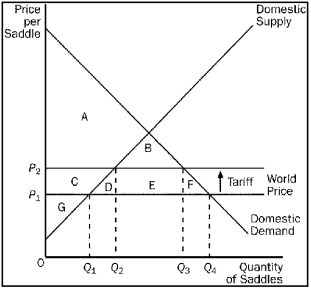 -Refer to Figure 9-15.Producer surplus with trade and without a tariff is
-Refer to Figure 9-15.Producer surplus with trade and without a tariff is
A) G.
B) C + G.
C) A + C + G.
D) A + B + C + G.
F) A) and C)
Correct Answer

verified
Correct Answer
verified
Multiple Choice
Chile allows trade with the rest of the world.We know that Chile has a comparative advantage in producing lemons if we know that
A) Chile imports lemons.
B) the world price of lemons is higher than the price of lemons that would prevail in Chile if trade with other countries were not allowed.
C) consumer surplus in Chile would exceed producer surplus in Chile if trade with other countries were not allowed.
D) All of the above are correct.
F) C) and D)
Correct Answer

verified
Correct Answer
verified
Multiple Choice
Figure 9-18.On the diagram below,Q represents the quantity of peaches and P represents the price of peaches.The domestic country is Isoland. 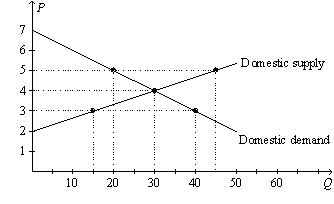 -Refer to Figure 9-18.If Isoland allows international trade and the world price of peaches is $5,then
-Refer to Figure 9-18.If Isoland allows international trade and the world price of peaches is $5,then
A) producer surplus will be smaller than it would be if Isoland banned trade.
B) consumer surplus will be smaller than it would be if Isoland banned trade.
C) the domestic quantity of peaches demanded will exceed the domestic quantity of peaches supplied.
D) Isoland will be an importer of peaches.
F) B) and D)
Correct Answer

verified
Correct Answer
verified
True/False
"Trade raises the economic well-being of a nation in the sense that the gains of the winners exceed the losses of the losers." This statement is correct for a nation that exports manufactured goods,but it is not correct for a nation that imports manufactured goods.
B) False
Correct Answer

verified
Correct Answer
verified
True/False
Policymakers often consider trade restrictions in order to protect domestic producers from foreign competitors.
B) False
Correct Answer

verified
Correct Answer
verified
Multiple Choice
Scenario 9-1 The before-trade domestic price of peaches in the United States is $40 per bushel.The world price of peaches is $52 per bushel.The U.S.is a price-taker in the market for peaches. -Refer to Scenario 9-1.If trade in peaches is allowed,the United States
A) will become an importer of peaches.
B) will become an exporter of peaches.
C) may become either an importer or an exporter of peaches,but this cannot be determined.
D) will experience increases in both consumer surplus and producer surplus.
F) C) and D)
Correct Answer

verified
Correct Answer
verified
True/False
The nation of Loneland does not allow international trade.In Loneland,you can buy 1 pound of beef for 2 pounds of cheese.In neighboring countries,you can buy 2 pounds of beef for 3 pounds of cheese.If Loneland were to allow free trade,it would export cheese.
B) False
Correct Answer

verified
Correct Answer
verified
Multiple Choice
Figure 9-11 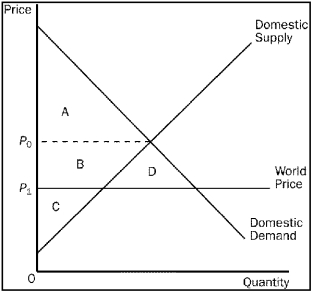 -Refer to Figure 9-11.Producer surplus in this market after trade is
-Refer to Figure 9-11.Producer surplus in this market after trade is
A) C.
B) C + B.
C) A + B + D.
D) B + C + D.
F) A) and C)
Correct Answer

verified
Correct Answer
verified
True/False
When a country that imports shoes imposes a tariff on shoes,buyers of shoes in that country become worse off.
B) False
Correct Answer

verified
Correct Answer
verified
Multiple Choice
Figure 9-14.On the diagram below,Q represents the quantity of crude oil and P represents the price of crude oil. 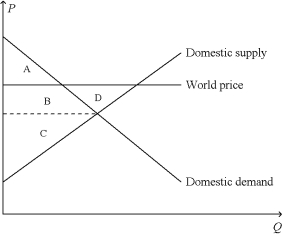 -Refer to Figure 9-14.When the country for which the figure is drawn allows international trade in crude oil,
-Refer to Figure 9-14.When the country for which the figure is drawn allows international trade in crude oil,
A) consumer surplus for domestic crude-oil consumers decreases.
B) the demand for crude oil by domestic crude-oil consumers decreases.
C) the losses of the domestic losers outweigh the gains of the domestic winners.
D) domestic crude-oil producers sell less crude oil.
F) A) and C)
Correct Answer

verified
Correct Answer
verified
Multiple Choice
Suppose France imposes a tariff on wine of 3 euros per bottle.If government revenue from the tariff amounts to 30 million euros per year and if the quantity of wine supplied by French wine producers,with the tariff,is 8 million bottles per year,then we can conclude that
A) the quantity of wine demanded by France,with the tariff,is 18 million bottles per year.
B) the quantity of wine demanded by France,without the tariff,would be 24 million bottles per year.
C) the amount of the deadweight loss is 24 million euros per year.
D) the tariff causes French buyers of wine to pay 2 euros more per bottle than they would pay without the tariff.
F) C) and D)
Correct Answer

verified
Correct Answer
verified
True/False
In principle,trade can make a nation better off,because the gains to the winners exceed the losses to the losers.
B) False
Correct Answer

verified
Correct Answer
verified
Multiple Choice
Which of the following arguments for trade restrictions is often advanced?
A) Trade restrictions make all Americans better off.
B) Trade restrictions increase economic efficiency.
C) Trade restrictions are necessary for economic growth.
D) Trade restrictions are sometimes necessary for national security.
F) B) and D)
Correct Answer

verified
Correct Answer
verified
Multiple Choice
After a certain nation changed its policy from one that banned international trade in wheat to one that allowed international trade in wheat,the nation began importing wheat.As a result,total surplus in the wheat market increased by $10 million.Which of the following changes could have occurred as well?
A) The price of wheat in that nation increased with the adoption of the new policy.
B) The domestic quantity of wheat supplied increased with the adoption of the new policy.
C) Consumer surplus in the wheat market increased by $7 million and producer surplus in the wheat market increased by $3 million.
D) Consumer surplus in the wheat market increased by $15 million and producer surplus in the wheat market decreased by $5 million.
F) C) and D)
Correct Answer

verified
Correct Answer
verified
Multiple Choice
Suppose a country abandons a no-trade policy in favor of a free-trade policy.If,as a result,the domestic price of beans increases to equal the world price of beans,then
A) that country becomes an exporter of beans.
B) that country has a comparative advantage in producing beans.
C) at the world price,the quantity of beans supplied in that country exceeds the quantity of beans demanded in that country.
D) All of the above are correct.
F) B) and C)
Correct Answer

verified
Correct Answer
verified
Multiple Choice
Figure 9-2 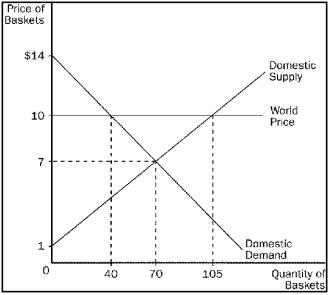 -Refer to Figure 9-2.With free trade,producer surplus is
-Refer to Figure 9-2.With free trade,producer surplus is
A) $80.00.
B) $210.00.
C) $245.50.
D) $472.50.
F) A) and B)
Correct Answer

verified
Correct Answer
verified
Multiple Choice
The market for corn in Wheatland consists solely of domestic buyers of corn and domestic sellers of corn if
A) consumer surplus equals producer surplus in the Wheatland corn market.
B) total surplus exceeds consumer surplus in the Wheatland corn market.
C) Wheatland permits international trade in corn.
D) Wheatland forbids international trade in corn.
F) All of the above
Correct Answer

verified
Correct Answer
verified
True/False
If a country allows free trade and its domestic price for a given good is lower than the world price,then it will import that good.
B) False
Correct Answer

verified
Correct Answer
verified
True/False
Domestic consumers gain and domestic producers lose when the government imposes a tariff on imports.
B) False
Correct Answer

verified
Correct Answer
verified
Showing 381 - 400 of 406
Related Exams